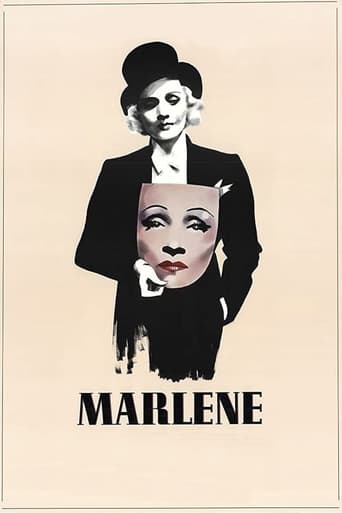blanche-2
I've seen another documentary on Marlene Dietrich and also read her daughter's book. I was interested in this one for a bizarre reason- I once sat on the New York subway next to someone who had the script of this documentary with him. Being a big fan of Maximilian Schell's, I wanted to see it.Schell, who appeared with Dietrich in "Judgment at Nuremberg," was able to convince the actress to do this documentary, but she would not permit herself to be shown on camera. She was last seen in the 1978 film Just a Gigolo, heavily made up and behind a veil, but still looking mighty good to me. But if one reads her daughter's book, it's easy to see that as she aged, she became a little eccentric. She spent the last 11 years of her life bedridden and allowed very few people to see her.So the famous Dietrich voice supplies a narration of sorts to the glorious film clips, clips of her in newsreels, and film of her doing her one-woman show. It is all glorious, showing how she evolved over the years, her excellent acting in films like "Judgment at Nuremberg," "Witness for the Prosecution," and "Touch of Evil," and the incredible charisma and beauty she shared with the audience in her show. At one point, Schell offends her and she lays into him. making a remark about him being a "Swiss", and telling him she'd sat at tables with politicians and dignitaries and no one had ever spoken to her like that. She went on for a while. Schell punctuates her words with images of flying film strips and a whizzing, distorted background.She could be abrupt, but also emotional as she recites a favorite poem of her mother's. Dietrich talks like she hated making movies, didn't do much to get into a role, her private life was private. It's hard to say now. One thing that wasn't gone into was her passion for Jean Gabin, nor was much of the documentary focused on her war work. Marlene Dietrich was a magical personality, an exotic beauty, a wonderful actress, and a magnificent performer. This documentary gives us plenty of examples of her magic and, if you don't appreciate her now, you will after seeing this. She was the kind of star we won't see again - androgynous, earthy, and very much of her time. In her eighties when this was made, her attitude is very much like her final words in Touch of Evil: "What does it matter what you say about people?"
gavin6942
A documentary retrospective on the career of enigmatic screen diva Marlene Dietrich.I do not really know much about Marlene Dietrich. I have seen a few of her better known films, such as "Blue Angel", but know almost nothing about her personally. This documentary was good for fixing that, really allowing her to tell her story in her own words.Apparently she did not want to be filmed, but agreed to be recorded. I actually think this makes for a better film. It allows for more footage to be shown, which is great when so many of her earlier works are hard to track down. Also, it serves little purpose to show her as an elderly woman... I mean, especially now that we saw how much better the screen time can be used.
Michael Neumann
Maximilian Schell's documentary portrait of legendary screen siren Marlene Dietrich separates the woman from her myth, but because Dietrich herself refused to appear on camera the director was presented with a dilemma: how to construct the film without its subject? His clever (if desperate) solution was to document, instead, his own frustration in making the film, using Dietrich's disembodied, tape recorded voice to supplement scenes of the director scrambling for cohesive footage.Surprisingly, the finished film (messy as it often is) creates a remarkably full picture of the reclusive star, despite (and in large part because of) her absence. Dietrich's voice alone – obstinate, caustic, skeptical of Schell's project, scornful of her own allure – says more (with more insight) than any scripted monologue could provide, and her unedited conversations with Schell (an old comrade) are unpredictable and candid, often becoming verbal sparring matches in two languages.
Signet
Schell turns Dietrich's refusal to appear on-camera for him from what could have been a disaster to a distinct artistic advantage. Being able only to hear her growl her own commentary over scenes from earlier films, newsreels, etc., gives this picture an amazing power and poignancy that it would not have otherwise. An amazing movie.


